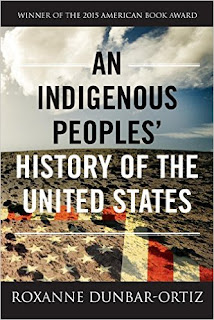An Indigenous Peoples' History of the United States—Roxanne Dunbar-Ortiz
The history of the United States is a history of settler colonialism—the founding of a state based on the ideology of white supremacy, the widespread practice of African Slavery, and a policy of genocide and land theft. Those who seek history with an upbeat ending, a history of redemption and reconciliation, may look around and observe that such a conclusion is not visible, not even in utopian dreams of a better society. (2)
A red thread of blood connects the first white settlement in North America with today and the future. (196)
One of the areas where my goal for reading diversely (genres, topics, authors, characters, etc.) is not as robust is books that center Indigenous people, and especially in nonfiction. This book is part of a series, currently with four books, called ReVisioning American History, a series which aims to offer fresh perspectives on history, specifically from historically marginalized and underrepresented voices.
With that in mind, I went about seeking something that could start me along the path, that was more of an overarching history. This book popped up on a number of lists and seemed a good place to start. Dunbar-Ortiz begins with the development of the Americas in all of the vast time pre-Colonialism: the development by Mayans; how the Aztecs are to the Americas what Romans were to Europe and what the Mongols were to Asia; the development of irrigation canals, roads, a highway system—all before Europeans arrived and "discovered" the place. There was little disease, there was much nation building—it's difficult not to imagine pre-Colonialism America as an evolved, semi-utopian paradise, filled with reciprocity, government, and little disease. She continues through the gruesome and shameful Colonialist period that we all know about, through the 1960s and the Occupation of Alcatraz by a number of Indigenous people, and the readvent of Indian activism.
Though there are many specific instances in history that epitomize the historic and continued abuse of and disregard for Indigenous lives, I'm not going to include any of them here. It's really not that long of a book, it's a great primer on the history, and it's too vast for me to try to boil down to handpicked events.
But there are a few overarching themes within the larger theme that seem important to point out, especially as they are things I had not considered before and which were certainly not presented in a contextualized manner in history classes. One is the colonizers and their "Christian zeal," which they used to justify colonialism and encourage a militaristic tradition. This feels like an important point, because this is actually a tired old tactic that we still see today, both in America and across the world. Juxtapose that sense of entitlement as "Christians" with the same folks who encouraged slavery and used scalps and Indigenous children as currency...well, doesn't seem too Christian to me, but what do I know? This is still a prevalent hypocrisy.
Another is the myth that the majority of Indigenous peoples who died during Colonialism died as a result of diseases for which they had no immunity. As Dunbar-Ortiz points out, this idea is being purposefully blind to the brutal and militarily-driven expulsion and execution of Indigenous peoples. (Dunbar-Ortiz says, "Proponents of the default position emphasize attrition by disease despite other causes equally deadly, if not more so. In doing so they refuse to accept that the colonization of America was genocidal by plan, not simply the tragic fate of populations lacking immunity to disease.") Now, the myth is definitely what I was sold throughout almost all of my history courses. And I had A LOT of them throughout the years. I don't think that any of my history classes appropriately represented the purposeful nature of colonizers actions against the Indigenous occupants.
I understand that one of the reasons that we don't talk about these elements of history in a fully truthful way is because then we might have to confront and interrogate what our origins really are as a nation, and that's a terrifying prospect to many people. (Mostly white men, let's be honest.) If the origins of our nation were not really as pure and idealistic and egalitarian as we would like to believe, well then who even are we? These are big questions, for sure. Avoiding confronting them altogether is probably not the answer, though, I would argue. As Dunbar-Ortiz puts it, "The affirmation of democracy requires the denial of colonialism, but denying it does not make it go away."
I would highly recommend this book for anyone who is looking to expand their knowledge base, to be more aware of our origins as a nation, and to get another insight than the (mostly) white men who write our history textbooks.



Comments
Post a Comment